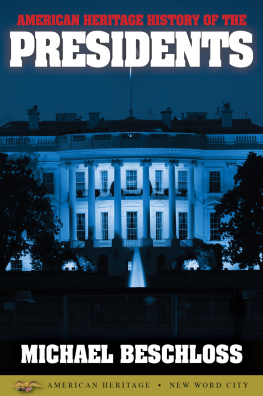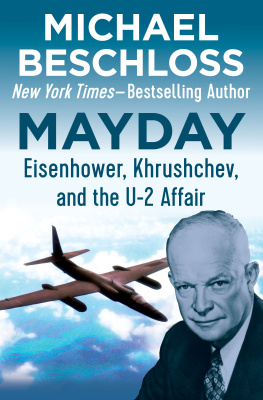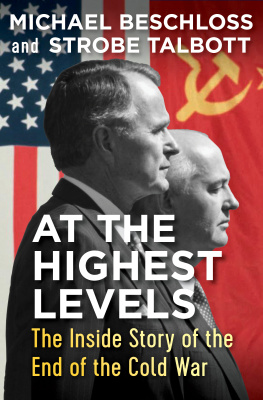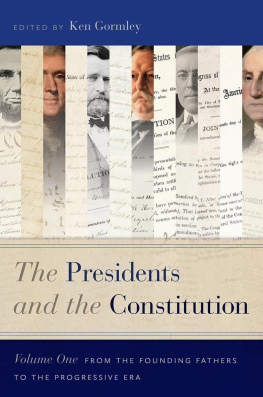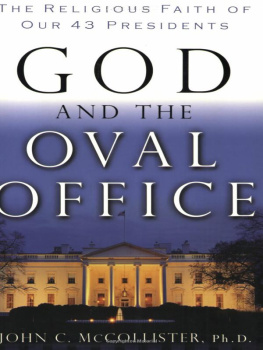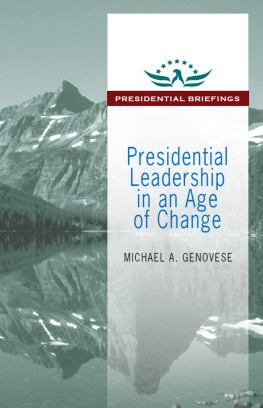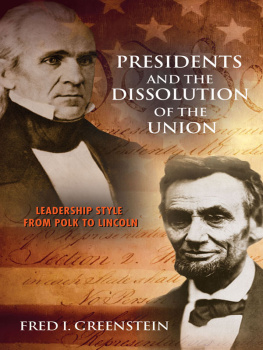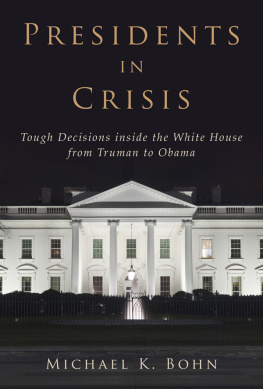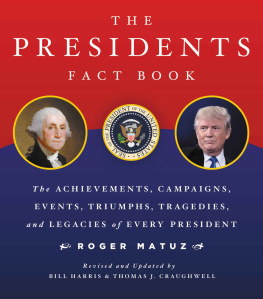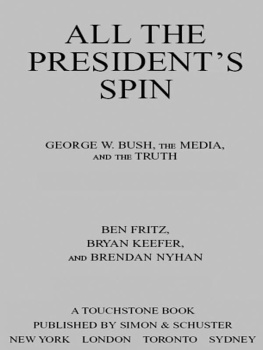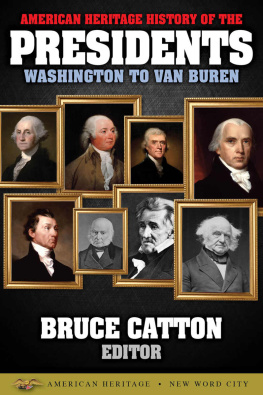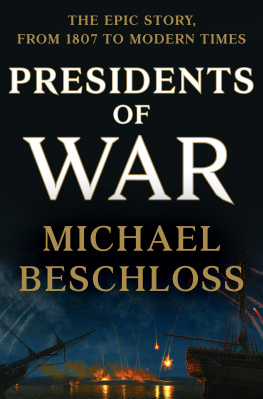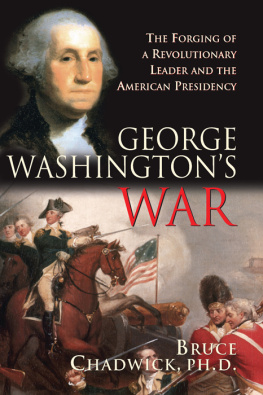Michael Beschloss - American Heritage History of the Presidents
Here you can read online Michael Beschloss - American Heritage History of the Presidents full text of the book (entire story) in english for free. Download pdf and epub, get meaning, cover and reviews about this ebook. year: 2015, publisher: New Word City, Inc., genre: Science. Description of the work, (preface) as well as reviews are available. Best literature library LitArk.com created for fans of good reading and offers a wide selection of genres:
Romance novel
Science fiction
Adventure
Detective
Science
History
Home and family
Prose
Art
Politics
Computer
Non-fiction
Religion
Business
Children
Humor
Choose a favorite category and find really read worthwhile books. Enjoy immersion in the world of imagination, feel the emotions of the characters or learn something new for yourself, make an fascinating discovery.
- Book:American Heritage History of the Presidents
- Author:
- Publisher:New Word City, Inc.
- Genre:
- Year:2015
- Rating:4 / 5
- Favourites:Add to favourites
- Your mark:
- 80
- 1
- 2
- 3
- 4
- 5
American Heritage History of the Presidents: summary, description and annotation
We offer to read an annotation, description, summary or preface (depends on what the author of the book "American Heritage History of the Presidents" wrote himself). If you haven't found the necessary information about the book — write in the comments, we will try to find it.
Here, from American Heritage, is the story of our presidents. From George Washingtons reluctant oath-taking through George W. Bushs leadership challenges after September 11, 2001, we view ambitious and fallible men through the new lens of the twenty-first century. Where did they succeed? Where did they fail? And what do we know now that we could not have known at the time?
American Heritage History of the Presidents — read online for free the complete book (whole text) full work
Below is the text of the book, divided by pages. System saving the place of the last page read, allows you to conveniently read the book "American Heritage History of the Presidents" online for free, without having to search again every time where you left off. Put a bookmark, and you can go to the page where you finished reading at any time.
Font size:
Interval:
Bookmark:
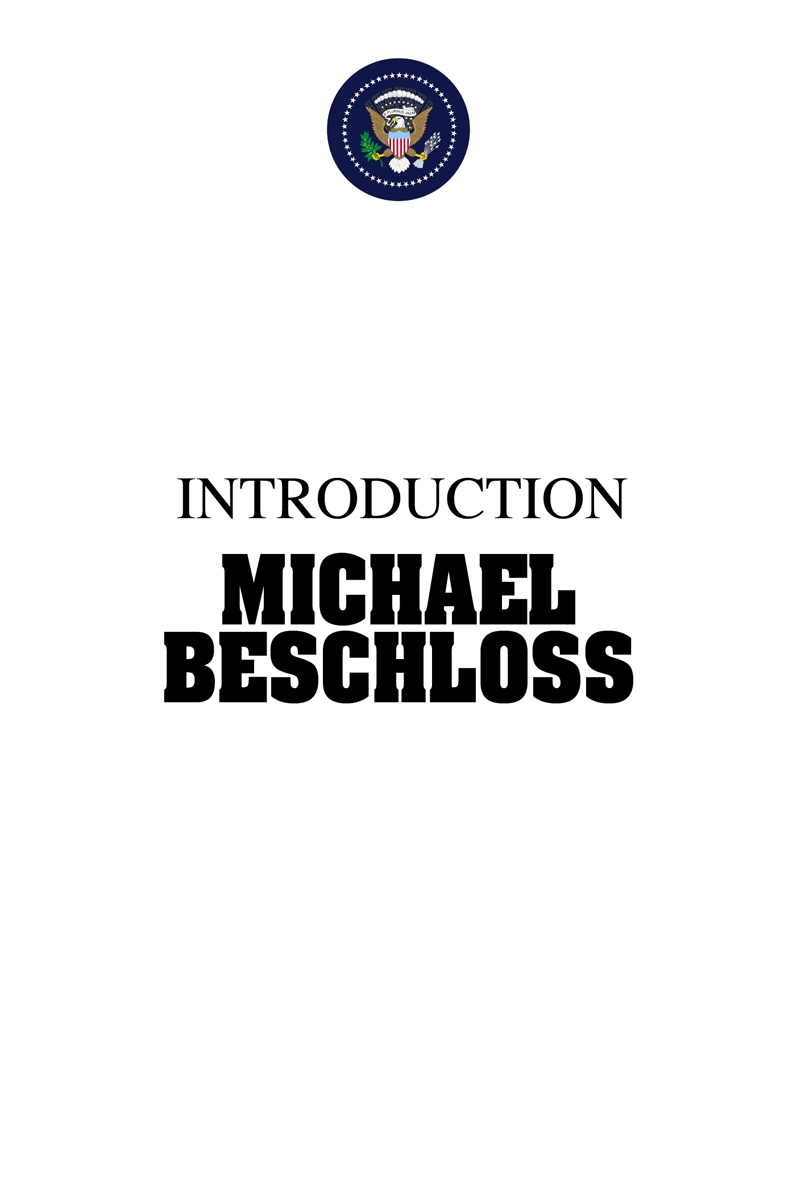
The first president of the United States I ever saw was Richard Nixon, during his 1960 campaign against John Kennedy. At the age of four, I am told, I was held up in the air as the future presidents motorcade sped down the Lincoln Highway in Illinois, where I lived. That fall, Nixon was promising Americans that if they made him president, your children and grandchildren wont grow up under Communism. To drive home his point, the Nixon campaign wanted his parade routes lined by small girls and boys. I was one of those.
My fascination with presidents grew. At the age of six, when I watched on television as John Glenn became the first American to orbit the earth, I was struck when one of the commentators said that Glenn was putting his life in danger to advance President Kennedys dream that Americans get to the moon by the end of the decade. Later that year, I saw Kennedy tell us on television that he would risk nuclear war to get Soviet missiles out of Cuba. Knowing how neighboring towns were sometimes demolished by tornadoes, I wondered whether mine (population 4,600) would be leveled by a nuclear attack.
Three years later, I kept on seeing, or so I thought, the same picture, day after day, week after week, on the flag-emblazoned front page of the Chicago Tribune. The image was of a smiling Lyndon Johnson signing a bill, with members of Congress clustered behind him. Only later did I understand that it only looked like the same picture and that Johnson was enacting the most substantial body of social legislation in history. That year - 1965 - LBJ also began his first major escalation of the conflict in Vietnam. My fifth-grade teacher gravely told our class, You boys and girls may not realize it yet, but your country is at war.
It would have been difficult for any American who grew up during the 1960s - the Cold War confrontations, the struggle for civil rights, the Great Society, Vietnam, the race to the moon - to escape the notion that a president loomed, almost physically, over the lives of every American. I presumed at the time that this must have been true for most of American history. Only much later, as a historian, did I come to understand how sharp were the ebbs and flows of presidential power - and of the quality of the men who have served in Americas highest office. In this book, you will discover those forty-one men in the context of their times, rendered by some of our most accomplished historians - their traumas and joys, their public words and private struggles as they all helped to shape the American story.
You will read of stirring displays of presidential leadership that continue to affect us today: George Washington inventing key elements of our political system, Andrew Jackson battling the Bank of the United States, Abraham Lincoln binding the Union, Theodore Roosevelt and Woodrow Wilson involving the government more than ever before in our economic affairs and expanding our role among nations, Franklin Roosevelt rescuing our society and the world, Harry Truman improvising the means that would defeat the Soviet empire, Ronald Reagan seeking to end the Cold War.
What makes these achievements all the more spectacular is that our presidents have all operated under a Constitution that did not grant them unilateral power. This was not accidental. On the cusp of independence, the founders of the new American republic did not wish to endow the presidency with powers that might lead to some new American version of the British monarchy they had fought so hard to shake off.
This book illuminates the contrast between the limited powers of the office and the acts of presidential leadership that have driven so much of our history. You will see how frequently, thanks to the American system, our people have managed to choose leaders who have had the character to alter public opinion, the vision to spot public dangers and opportunities, and the skills to get Congress, citizens, and sometimes the world to share their view of the way things should be.
More than anyone else, George Washington demonstrated how the strictures of the Constitution would be translated into actual power. The old hero recognized, as Robert Rutland shows in this book, that he was setting one precedent after another - his refusal to be called His Mightiness or His Elective Majesty, his diplomacy, his efforts to fashion a legal structure for the new land, his demonstration, in putting down the Whiskey Rebellion, that the United States was able and willing to support our government and laws, his refusal to accept a third term.
It was left to John Adams to follow the adored and groundbreaking leader who had stood above partisanship to navigate grave crises with France and with Alexander Hamilton. Adams was the first president to live in the Executive Mansion. He understood the potential of the white stone house as a unifying symbol of the new democracy, writing his famous prayer that heaven bestow the best of Blessings on this House and all that shall hereafter inhabit it and that none but honest and wise men ever rule under its roof.
The quintet of presidents who followed Adams suggested that his prayer had been heard: Thomas Jefferson, who demanded a government rigorously frugal and simple and had the foresight to double the size of the new nation with the Louisiana Purchase; James Madison, who took the country through the War of 1812 and helped establish the United States as a world power; James Monroe, who fashioned an enduring foreign policy doctrine; John Quincy Adams, who set out the need for a national system of roads and canals, thoughtful regulation of national resources, and government aid to education; Andrew Jackson, who expanded the powers of the office, waged war against the notion of a national bank, expunged the national debt, and became a peoples hero.
For the next quarter-century, with the exception of James Polk, who pursued American expansion and revived the independent treasury, the candlepower of the presidency dimmed. Martin Van Buren struggled against the Panic of 1837. William Henry Harrison died after a month in office. John Tyler, His Accidency, established the expectation that presidents-by-succession assumed the office in full and annexed Texas, but was ultimately expelled by his own party. Zachary Taylor, Millard Fillmore, and Franklin Pierce were among the weakest leaders ever to serve as president.
The final president before the Civil War, James Buchanan, embodied the failure that shadowed the reputations of his seven immediate predecessors: Each had tried to paper over the deepening issue of slavery that divided the American people, endangered the Union, and threatened to make a mockery of the American notion of democracy.
Few historians would disagree that Abraham Lincoln was our greatest president. What better demonstration could there be of the American idea that anyone can become president than a boy who sprang from the short and simple annals of the poor with a year and a half of sporadic formal education; who mastered Euclid, the Bible, Shakespeare, and Blackstone; made himself the natural leader of almost any community he entered; and then went on to confront the issue of slavery and save the Union with a costly and complicated war?
The end of the Civil War, which had seen Lincoln expand the powers of his job to prevail over the Confederacy, might have opened the way to a new era of strong presidents. It did not. The most severe crisis of the Union was over, and as Reconstruction unfolded, the Congress, Supreme Court, and the American people were eager to whittle the presidency back to more human scale.
It was in 1888 that the widely read British scholar and diplomat James Bryce wrote Why Great Men Are Not Chosen Presidents. Andrew Johnson had been impeached. Ulysses Grants administration had grown entangled in scandal and economic crisis. Although Rutherford Hayes helped to restore the office after the tremors of Johnson and Grant, he was constrained by his failure to win the popular vote and his pledge to serve merely a single term. James Garfield was murdered after a half-year in office. Chester Arthur and Benjamin Harrison were only too happy to allow Congress to take the drivers seat. Although Grover Cleveland aspired to strengthen the presidency, he was frustrated in many of his public ambitions. As you read about these presidents, you might well ask yourself whether America could have been a greater country during this era had it benefited from stronger executive leadership - or was this a period in which the nation, after the greatest crisis in its history, had to lick its wounds and consolidate?
Font size:
Interval:
Bookmark:
Similar books «American Heritage History of the Presidents»
Look at similar books to American Heritage History of the Presidents. We have selected literature similar in name and meaning in the hope of providing readers with more options to find new, interesting, not yet read works.
Discussion, reviews of the book American Heritage History of the Presidents and just readers' own opinions. Leave your comments, write what you think about the work, its meaning or the main characters. Specify what exactly you liked and what you didn't like, and why you think so.

